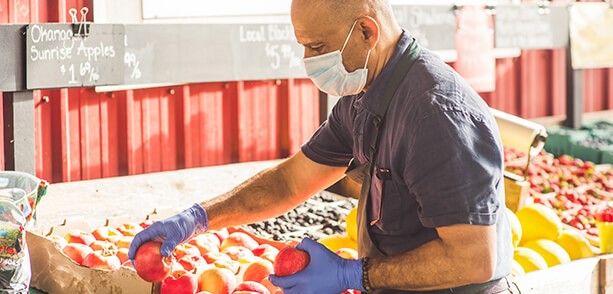BC’s agrifood sector was among those singled out as a priority for funds as part of the $1.5 billion stimulus package BC announced September 17 to help businesses recover from COVID-19.
While agriculture was designated an essential service during the pandemic, shifts in consumer spending required that businesses adapt rapidly. Added expenses from measures aimed at protecting farm workers and visitors from COVID-19 added to short-term costs.
Accompanying the heading, “Supporting B.C. businesses,” the province shows a masked worker stocking Okanagan Sunrise apples with gloves on. Programs to support these and other food sector workers have been allocated $25 million.
However, many of the programs are already in existence. These include the $3 million for the agritech grant program, administered by the Investment Agriculture Foundation of BC, and $5.6 million for expanding the BC Food Hub Network. The biggest tranche of funding is $12 million to detect and eliminate invasive species.
Smaller amounts are dedicated to on-farm innovation ($1.6 million) and “small farm business acceleration” as well as the provincial replant program ($890,000).
In addition to these agriculture-specific programs, a $500 million investment program, InBC, is being set up to help businesses scale up. To support new investment in machinery and equipment, the province will offer a 100% rebate on provincial sales taxes on eligible purchases.
But there’s a catch: the rebates won’t be available until April 1, 2021. The criteria for InBC is also being developed and won’t be known until next spring.
“It is not yet clear how BC’s newly announced economic recovery plan will support individual farmers and we look forward to more details as they unfold,” says Reg Ens, executive director of the BC Agriculture Council. “A safe reliable food system requires investment by government.”
With a provincial election campaign ramping up, he hopes all parties will take the challenges agriculture faces as a result of COVID-19 into account.
“BCAC is looking forward to seeing how all parties will address farm resiliency in their election platforms as BC farmers and ranchers continue to adapt to the realities of the pandemic,” he says.


 Province launches meat consultation
Province launches meat consultation